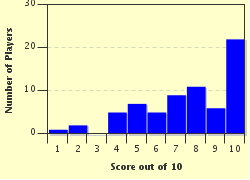Quiz Answer Key and Fun Facts
1. Mention croquet in literature and many people's thoughts turn first to Lewis Carroll's "Alice's Adventures in Wonderland". What, respectively, did Alice use for mallet and ball?
2. "Consider that everything I am writing of took place in an almost pre-historic era in the history of British India. Some folk may remember the years before lawn-tennis was born when we all played croquet. There were seasons before that, if you will believe me, when even croquet had not been invented, and archery - which was revived in England in 1844 - was as great a pest as lawn-tennis is now."
Which author, noted for his connections with India, was responsible for these words?
3. "There's mamma," said Lily. "Mamma, Mr Crosbie wants to play croquet by moonlight."
"I don't think there is enough light for that," said Mrs Dale.
"There is light enough for him," said Lily, "for he plays quite independently of the hoops; don't you, Mr Crosbie?"
The passage is taken from "The Small House at Allington". This is part of which series of novels by Anthony Trollope?
4. "'My sister Beth is a very fastidious girl, when she likes to be', said Amy, well pleased at Beth's success. She meant `fascinating', but as Grace didn't know the exact meaning of either word, fastidious sounded well and made a good impression. An impromptu circus, fox and geese, and an amicable game of croquet finished the afternoon."
Which novel features sisters called Beth and Amy?
5. ""Alexis has failed us," she said in French. "He writes that he cannot come." She spoke in a natural and matter-of-fact tone, as if it never entered her head that Vronsky had any other interest for Anna than as a croquet player."
The relationship between Count Vronsky and Anna Karenina continues through the novel that bears her name. Who was the author?
6. "I think there should be more croquet, for one thing," said young Clintock; "I am usually away, but if I were more here I should go in for a croquet club. You are one of the archers, I think. But depend upon it croquet is the game of the future. It wants writing up, though. One of our best men has written a poem on it, in four cantos; - as good as Pope. I want him to publish it - You never read anything better."
The passage is taken from "Daniel Deronda", the last completed novel by which English author?
7. "'Now you're always running about', he said, 'Can you find Marian and ask her to make a four at croquet? It's all we're any of us good for. We've looked for her and can't find her, but I believe you have her in your pocket.'"
Which novel includes croquet, an illicit relationship and a man named Leo, looking back on his interaction with the adult world as a young boy?
8. "Ruthie said, 'Le's look aroun'.' They strolled down the line of tents, peering into each one, gawking self-consciously. At the end of the unit there was a level place on which a croquet court had been set up. Half a dozen children played seriously. In front of a tent an elderly lady sat on a bench and watched. Ruthie and Winfield broke into a trot. 'Leave us play,' Ruthie cried. 'Leave us get in.'"
The passage is taken from which classic novel, that describes life in America during the Dust Bowl years?
9. "'Yes. Everything he touched seemed to turn to gold . . . except the Overlook. He funneled over a million dollars into it before the first post-war guest ever stepped through its doors, turning a decrepit relic into a showplace. It was Derwent who added the roque court I saw you admiring when you arrived.'
'Roque?'
'A British forebear of our croquet, Mr. Torrance. Croquet is bastardized roque.'"
Which Stephen King novel features an Overlook hotel with a roque court?
10. "'The Scotch in this glass is probably the brand Yancy endorses. The same with tennis balls. Only he doesn't play tennis - he plays croquet. All the time, every weekend.' Accepting his fresh drink Eckmund finished, 'So now everybody plays croquet.'
'How can croquet be a planet-wide sport?' Taverner demanded.
'This isn't a planet,' Dorser put in. 'It's a pipsqueak moon.'"
Anyone for croquet in space? The short story "The Mold of Yancy" was published in 1991 as part of "The Minority Report", a collection of stories by which sci-fi author?
Source: Author
glendathecat
This quiz was reviewed by FunTrivia editor
agony before going online.
Any errors found in FunTrivia content are routinely corrected through our feedback system.

